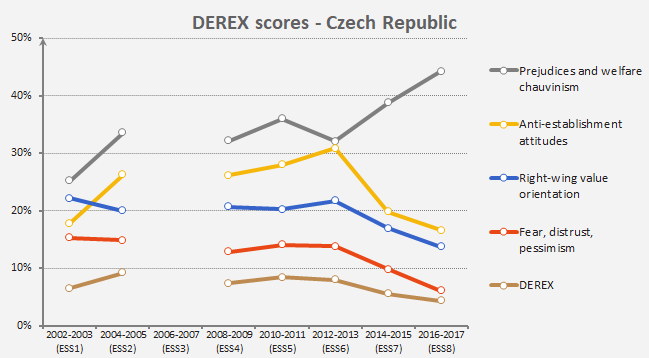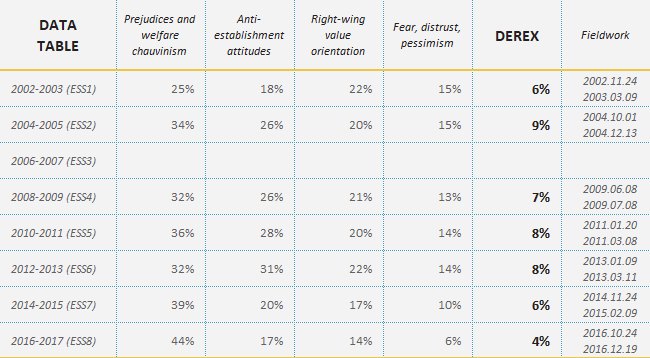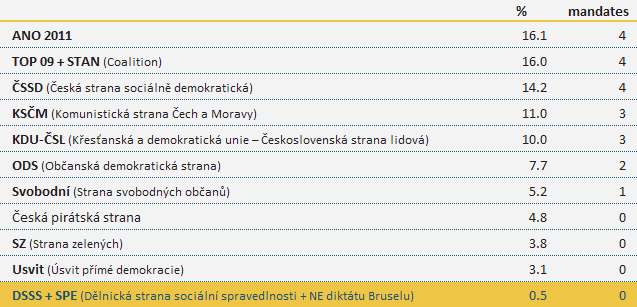Czech Republic
Factsheet
| ETHNIC MINORITIES: | |
|
Moravian: Roma: Slovak: |
3.7% 2.0% 1.9% |
| RELIGIONS: | |
|
Roman Catholic: Protestant: Greek Catholic: |
68.9% 10.8% 4.1% |
| NET MIGRATION: | 240,466 |
| POP. GROWTH RATE: | +0.2% |
| GDP GROWTH: | +0.9% |
| GDP PER CAPITA: | 18,683 |
| UNEMPLOYMENT: | 7.0% |


Workers’ Party of Social Justice (Dělnická strana sociální spravedlnosti, DSSS)

Between 2004 and 2010 DSSS’s predecessor, the Worker’s Party (Czech: Dělnická strana, DS) was a far-right, anti-Semitic and anti-Roma party, promoting national socialist ideology. Although in the general elections of 2006 and 2008 the party did not field independent candidates, its members assisted the campaigns of several parties. At the 2010 election DSSS ran as a member of a six-party far-right block, yet it still managed to receive only 1.14% of the votes. The organization’s key talking points cover the usual topics, including withdrawal from the European Union and NATO, a ban on immigration, the rejection of gay rights and the restoration of the death penalty. The party first came to the attention of the authorities in 2007 when it started to display banners resembling former NSDAP symbols and its members expressed their affiliation with the Nazi hand salute. The Czech Interior Ministry first filed papers in the courts to ban the party in 2008, describing the party’s activities as neo-Nazi attacks against the minorities and the constitutional order, which violates the right to form a party. However, in 2009 the court first rejected the government’s charges claiming lack of sufficient evidence, and eventually in 2010 the Czech High Court banned the party based on a new petition. The party has been associated with violent far-right groups attacking the Roma population with Molotov cocktails, and this contributed to its dismemberment. Following its ban, the party was renamed the Workers’ Party of Social Justice and, for all practical purposes, it continues to operate with the same membership and leader, Tomáš Vandas. To avoid a subsequent ban, the reconstituted organization formally declared its commitment to democratic norms and opposition to discrimination based on race, age or gender.
At the party’s general assembly held January 18, 2014, it officially embarked on the 2014 European campaign. As the three main topics of the campaign, the party’s leader recommended the reorganization of the European Union to restore national sovereignty, the abandonment of the common currency and blocking the migration ”tsunami. Proposed actions against migrants are likely to be linked to a rejection of the Roma population.
DSSS on the Internet:
Source:
- Political Capital
European elections - May 23-24, 2014


Parliamentary elections (Chamber of deputies) - May 28-29, 2010


European Parliament elections - June 5-6, 2009

Source: Czech Statistical Office
Our thematic websites
Political Capital's analyses and activities in English.
Research and advocacy programme focused on the role conspiracy theorising plays in shaping populist and radical politics.
Our project New electoral system in Hungary: watchdogging, advocacy and raising awareness focuses on the electoral reform in Hungary.
Our blog on political and societal extremism and conspiracy theories.
DEREX website is supported by










